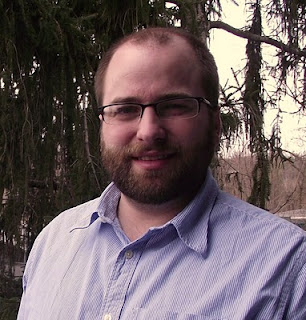 The ETC blog team proudly presents a new blog team member:
The ETC blog team proudly presents a new blog team member: John Meade
Meade is a candidate for the PhD (ABD) at The Southern Baptist Theological Seminary in Louisville, Kentucky in the department of Old Testament. His dissertation is “A Critical Edition of the Fragments of Origen’s Hexapla of Job: 22-42,” which is also being compiled for the Hexapla Institute, of which he is a part (www.hexapla.org).
He has many interests in the area of biblical textual criticism including Hebrew Bible, LXX, Hexapla, NT, and the study of the ancient versions for their interpretation of the text.
The ETC team is particularly happy to strengthen its competency in the field of Septuagint studies, and we look forward to many interesting blogposts by John.
Welcome!
Welcome aboard, John. Perhaps you could start out by telling us how many non-NT Biblical Greek mss have been identified, and approximately how they break down into:
ReplyDeletePentateuch
History
Poetry
Psalms
Prophets
Intertestamenta
Pseudopigrapha
Fragments
Entire OT (are there any other than the famous three?)
Daniel,
ReplyDeleteThanks for the welcome, and the very easy question :).
I do not have the exact number of non-NT mss on the top of my head, but the standard catalogue of mss used by Goettingen is as follows:
RAHLFS, ALFRED: Verzeichnis der griechischen Handschriften des Alten Testaments, MSU 2, Berlin (Weidmannsche Buchhandlung) 1914.
And Rahlfs, Alfred: Verzeichnis der griechischen Handschriften des Alten Testaments.
Die Überlieferung bis zum VIII. Jahrhundert. Bearbeitet von Detlef Fraenkel, Göttingen (Vandenhoeck & Ruprecht) 1. Auflage 2004.
The Verzeichnis describes each ms of the Greek OT that has been identified and used in the Goettingen Critical Editions.
I will do some digging to see if I can't answer your question more precisely.
I signed into blogger with my wife's account on that last comment. Sorry, still getting used to blogger :).
ReplyDeleteWelcome, John. May your studies be fruitful and useful.
ReplyDeleteNow that I know you exist I have a couple of quick questions:
Any plans for work in other parts of the Hexapla?
Are there any conjectural emendations in the OT, especially in Job, that seem particularly commendable to you?
Yours in Christ,
James Snapp, Jr.
Here's a valuable resource just coming online:
ReplyDeleteHolmes Vetus Testamentum Graecum
Welcome aboard :)
ReplyDeleteJames,
ReplyDeleteThanks for the welcome.
Currently, I have no plans to work in other parts of the Hexapla, but hopefully that will change :). Currently, Job is keeping me busy enough :).
At this point, I do not know of any conjectural emendations that are commendable to me. I like to work with the evidence of the mss and traditions, and the more I do so, the more I find these areas still unexplored. So I am really slow to accept the "council of despair." As I work through Job, I use Dhorme's commentary. He uses conjectural emendation from time to time, but he uses it less than his predecessors, mostly because the state of the evidence and its interpretation has improved over the years.
I will certainly keep this question in mind as I continue my work and I may comment on it in the future.
Daniel,
Thanks for bringing this on-line resource to my attention! Do you know if the other volumes of HoP are on-line yet?
This is, afaik, the only one online so far.
ReplyDeleteSpeaking of #'s of OT mss, it was reported in 1992 that the Russian National Library in St. Petersburg had 2500 Hebrew codices dating before 1100--ranging in size from 30 page fragments to a few OT's of over 1000 pages. Previous to glasnost, there were thought to be maybe thirty.